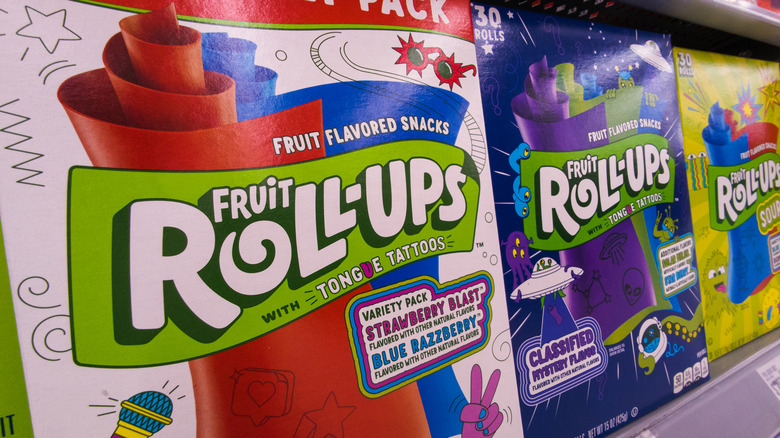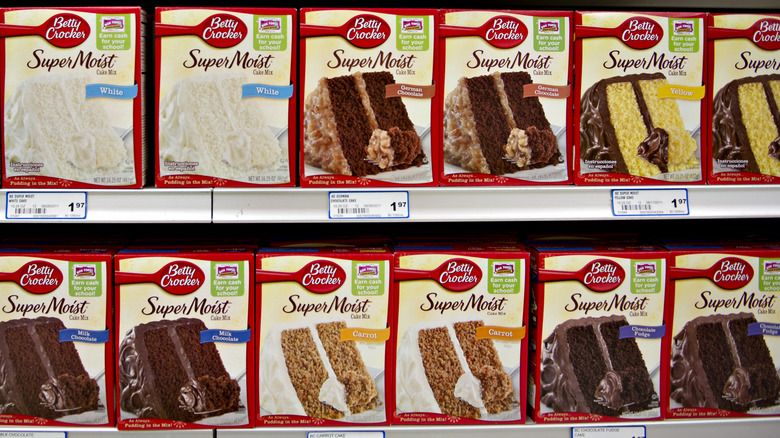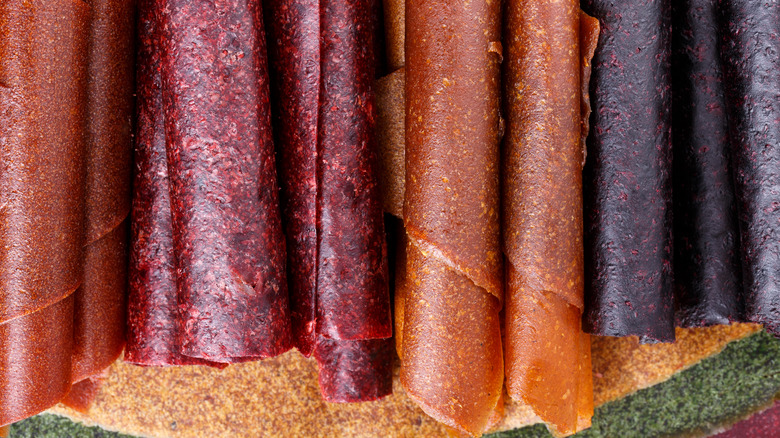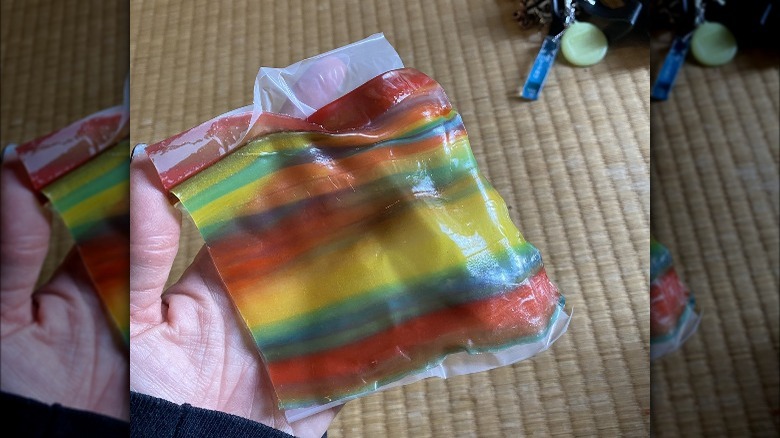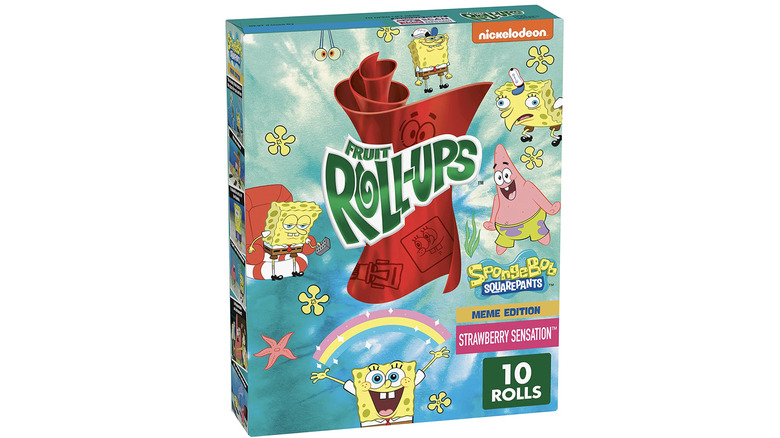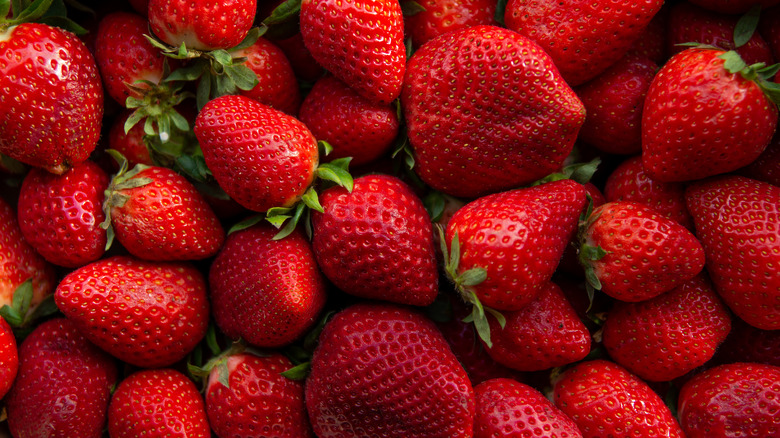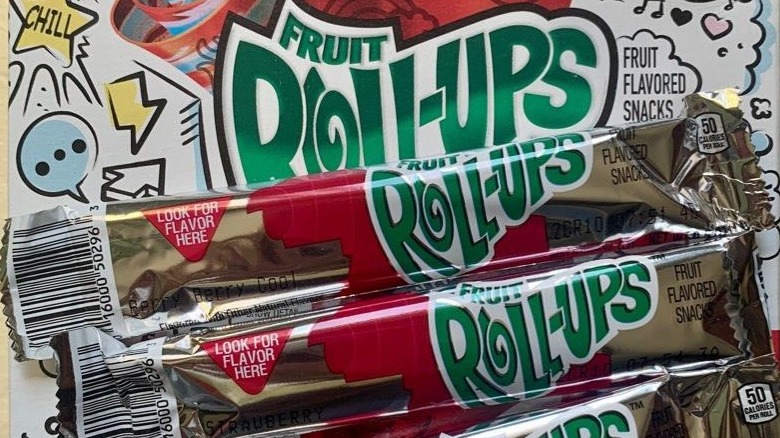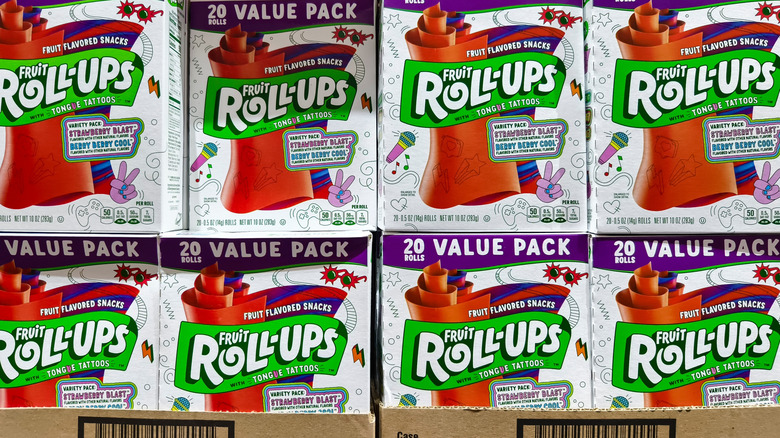Fruit Roll-Ups: 12 Juicy Facts About This Childhood Favorite Snack
Certain aspects of growing up tend to serve as benchmarks on the path to adulthood. There are countless universally-identifiable features of modern youth, from pop cultural touchstones like Sesame Street or the Teenage Mutant Ninja Turtles to the delights that make day-to-day life (and getting out of bed) worthwhile — like tooth-rotting, sugar-loaded sweets. Of course, if you grew up during or after the 1980s, one childhood treat is undoubtedly burned into your brain: Fruit Roll-Ups.
An absolute nightmare for pediatric dentists, Fruit Roll-Ups are the snack of (childhood) champions. First released in 1979, the fruit-flavored snack — which is produced by General Mills (often under its Betty Crocker brand) — just might take the cake when it comes to smile-inducing, blood-sugar-spiking nibbles. After all, could any other nutrient-deficient snack prompt a person to try and smuggle hundreds of pounds of food into a foreign nation, as occurred with Fruit Roll-Ups in Israel in May 2023? We doubt it.
Clearly, then, there's plenty more to the tale of Fruit Roll-Ups beyond its taste bud-satisfying nature. Since the gummy treat has delighted the nation's younger demographic for four decades (and counting), we decided to gather all the information about the legendary brand. For our fellow Fruit Roll-Up fanatics (we know you're out there), here are 12 juicy facts about this childhood favorite snack.
1. Fruit Roll-Ups were originally conceived during attempts to develop a fruit cake filling
While the accomplishments of Alfred Nobel are undeniably vast, the renowned Swedish scientist's most impactful contribution to modern society — dynamite — was largely created by chance. Similarly (if on a much smaller scale), when General Mills was looking to concoct a fruit filling for its cake mixes in 1975, it somehow ended up creating Fruit Roll-Ups instead.
It's sort of difficult to determine the precise path made from cake-mix-filling-research to fruit-leather-adjacent gummy snack. But, more than anything, it appears to be a matter of convenient timing. At the same time General Mills was attempting to create a viable fruit filling, in fact, it was in the midst of crafting its own fruit leather product as well (one similar to an item sold by an outside company).
How, exactly, the search for a shelf-stable cake filling led to the invention of an iconic fruit gummy snack is unclear. But those details aren't all that important, either. In fact, with four decades of glory (and counting) under its belt, we don't care what led to Fruit Roll-Ups' introduction — we're just thrilled they exist.
2. They began as a modified fruit leather snack
No matter how enticing a food might be, at times, the label used to describe or categorize the item in question can be downright off-putting. In that sense, it's hard to fault General Mills' decision to call its now-legendary gummy snack Fruit Roll-Ups as opposed to the product it was originally derived from: fruit leather.
Despite the fact that fruit leather sounds like the sort of snack a Caribbean pirate might have enjoyed in times of desperation while stranded on the seven seas, it's not actually some disgusting, barely-edible byproduct of chewable fruit material. Fruit leather is a chewy product derived from dried fruit puree, but the sweet snack is hardly akin to gnawing on a leather belt.
Of course, while Fruit Roll-Ups are, in essence, a mass-produced fruit leather product, the odds they could have obtained the undying loyalty of children under the name fruit leather seem slim to none. Hence, General Mills chose to call its creation a fruit roll instead, leading to the now-famous Fruit Roll-Ups banner.
3. Fruit Roll-Ups needed years of research and development before being introduced
The need to fine-tune a product before releasing it to the world is self-explanatory. We suppose there are some uber-talented individuals out there who can come up with a perfect, consumer-ready item without the need to rework or revise it beforehand. But for most of us, an extended period of trial and error is generally required before something is ready to share (like this article). General Mills seemed to follow this strategy with Fruit Roll-Ups, which took several years of development before their introduction in 1979 — then several more years before their nationwide release in 1983.
Fruit Roll-Ups' journey from initial conception to coast-to-coast popularity was slow and methodical, to be sure — and it doesn't appear to have been a linear process, either. After all, as we noted earlier, when General Mills first decided to concoct and produce a fruit leather-type snack, it did so while simultaneously researching ways to create a quality fruit filling for its line of cake mixes in 1975. In other words, the parallel projects took time to merge before Fruit Roll-Ups' official test launch began in 1979.
If there's a specific, verifiable explanation as to why Fruit Roll-Ups took an additional four years before expanding to grocery stores across the U.S. in 1983, we couldn't find it. Regardless, it appears General Mills took an exceptionally cautious approach when first introducing the childhood favorite snack — a strategy that paid dividends.
4. The man behind Fruit Roll-Ups' non-stick plastic wrapper was a prolific food scientist
If you've ever found yourself munching on a fresh Fruit Roll-Up and wondered how the fruit-flavored gummy snack so easily peels off the plastic wrapper, well ... you might be in the minority. Still, even if you (like us) have never given a second thought to the ease with which a Fruit Roll-Up pulls away from its inner plastic wrapper, there's still a reason you've never struggled to separate the two. In fact, you can thank one long-standing General Mills employee for its invention: Bob Zoss.
Interestingly enough, Zoss (who created the non-stick plastic wrapper used in Fruit Roll-Ups) doesn't just count this particular item among the feathers in his (inventor) cap. Having studied chemical engineering at the University of Minnesota, Zoss used his expertise and knowledge in food science to invent dozens of additional products during his 40-year career at General Mills.
Of course, of the five patents filed by Zoss throughout his illustrious career, it seems his plastic wrapper contribution takes the cake — or, should we say, takes home a family-size box of Fruit Roll-Ups.
5. Fruit Roll-Ups mascot The Great Rolupo was briefly introduced in the early 1990s
The cynical, economically-driven decision to utilize cute, often-cuddly, usually-animated mascots to increase a food item's appeal to children is nothing new. After all, one glance at our list of the most iconic food mascots reveals a cornucopia of kid-friendly spokespeople (or animals) throughout history. Of course, not every youth-focused food mascot has been destined for longevity. So if you'd forgotten (or missed entirely) the brief run of the Great Rolupo (a wizard Fruit-Roll-Ups-mascot) during the early 1990s, we wouldn't fault you.
Why did General Mills decide the perfect representative for its Fruit Roll-Ups snack brand would be a wizard character? We're not entirely sure. The character appeared to encourage consumers to enjoy the food product in a number of unique ways (advertising an alleged 1,001 different ways to do so).
Perhaps this explains the Great Rolupo's exceptionally brief run in the spotlight. We couldn't find the exact dates, but with less than two total years repping Fruit Roll-Ups, it seems the rest of the world found the Great Rolupo's appearance too baffling to enjoy, as well.
6. Fruit Roll-Ups have been one of the most popular snack foods for decades
To be sure, there's a plethora of plausible explanations as to why (and how) Fruit Roll-Ups staked their flag in the heart of young consumers (and the young at heart). It's a bonafide fact that the food is (and has been) one of the most popular snacks in the modern world.
Is it the product's different flavors that have allowed Fruit Roll-Ups to maintain a threshold of popularity for decades on end now? It certainly plays a part — particularly when you consider more than eight million U.S. households reported consuming at least one package of Fruit Roll-Ups the previous month in a 2020 survey. But the brightly-colored, inherently-playful nature of Fruit Roll-Ups likely explains why it ranks among the favorite snack foods of U.S. children, as well.
From the push-and-peel shapes seen in some packages of Fruit Roll-Ups to the temporary tongue tattoos found in others, there's plenty of play-with-your-food fun to be had with this fruit-flavored food item. And with no reason to expect this approach to change anytime soon, it seems this fruit gummy can maintain this status into the future.
7. Some Fruit Roll-Ups double as temporary tongue tattoos
While the snack's Fruit Roll-Ups' chemically-engineered taste hits all the right notes each time we enjoy one, we can't say its status as a childhood favorite lies solely with its flavor. The temporary tongue tattoos occasionally offered by the brand have something to do with it as well.
We're not entirely positive when, precisely, Fruit Roll-Ups first rolled out its temporary tongue tattoos to the world. Yet seeing how at least one commercial for the gimmick aired as far back as the mid-2000s, it doesn't appear to be a very recent addition (even if some U.K.-based parents were unaware of the temporary tongue tattoos before 2021).
Since nothing seems to please children more than pretending they're adults, offering temporary tattoos was a brilliant move (one made all the better by its intended use on the tongue). Just be forewarned that the image (or tattoo template) may be printed the correct way on your Fruit Roll-Up — meaning the words may end up printed backward on your tongue.
8. Despite the name, Fruit Roll-Ups contain little actual fruit
If you've somehow lived your life believing Fruit Roll-Ups are largely comprised of actual fruit, we've got some bad news for you, sunshine: the fruit-flavored snack actually only contains a bare minimum of real fruit (with pear puree concentrate as its sole fruit-based ingredient).
Of course, if you were under the mistaken impression that a product with the word "fruit" in its name would consequently contain a substantial amount of that food as well, you can blame General Mills for that. After all, the company doesn't have the greatest track record when it comes to honestly projecting the lack of fruit in Fruit Roll-Ups to the world. In fact, prior to 2014, the label for Fruit Roll-Ups boldly claimed that the product was "Made with Real Fruit." After legal pressure, the company removed that phrase from its packaging. General Mills would have had to disclose the actual percentage of fruit used in Fruit Roll-Ups to continue saying they were "Made With Real Fruit," and considering the fact that the pear puree is the fourth ingredient listed on the label (after three different types of sugar), we can assume it makes up a small fraction of the recipe.
9. Jeremy Lin received a life-size Fruit Roll-Up jersey from General Mills in 2012
Remember Linsanity — the incredibly brief, white-hot run of high-scoring performances by Jeremy Lin for the New York Knicks during the final two months of the 2011-12 NBA regular season? If you're not a basketball fan (or weren't following the NBA during the early part of 2012), you might not recall the star-turn-making string of games from Lin. Of course, while Lin himself certainly remembers his short time as an athletic hero, if he'd somehow forgotten, he could always gaze towards the life-size basketball jersey he received at the time — one made entirely out of Fruit Roll-Ups.
Now, under normal circumstances, we wouldn't expect a Fruit Roll-Up to remain in anyone's home after more than a decade has passed (because they would eat it, you see). But the unique, personal design of Lin's Fruit Roll-Up jersey clearly makes it more of a keepsake than a snack.
Actually, if Lin had gotten his way, it seems the Harvard University graduate would have actually consumed his one-of-a-kind gift. But the jersey's specially-designed frame may have kept his urges under wraps — and the jersey under glass.
10. A class action lawsuit in 2019 accused Fruit Roll-Ups of false advertising
One unfortunate reality of modern life is the relative lack of straightforward and honest advertisements. Of course, we can see how there's a (slight) difference between subtle deception and outright lying. The class action lawsuit filed against General Mills in August 2019 over Fruit Roll-Ups' claims of being "naturally flavored" with "no artificial flavors"alleged that the company lied to consumers. The suit focused on the artificial malic acid used in the snack, which General Mills argued didn't function as a flavor.
While some may question General Mills' motives, the final outcome of the lawsuit undercuts any assumption of nefarious intent. After all, whether or not you believe the food conglomerate was wholly innocent in this matter (or oblivious to the fact that the phrase "no artificial flavors" would attract a certain set of customers), a judge found General Mills' defense credible. In fact, the lawsuit over the validity of Fruit Roll-Ups' "naturally flavored" claims was dismissed with prejudice in July 2020 — meaning the plaintiff will be unable to file any additional lawsuits over the issue.
11. The brand debunked a rumor suggesting Fruit Roll-Ups' plastic wrapper is edible in 2023
Fruit Roll-Ups have had a busy time of late — although, to the fruit-flavored snack brand's credit, any publicity from the first half of 2023 doesn't appear to have been self-generated. Still, if any executives from General Mills believed they'd need to film a TikTok video imploring consumers not to eat the plastic wrappers attached to a Fruit Roll-Up that year, we'd like to meet that soothsayer (since they can predict the future).
How this rumor (which suggested Fruit Roll-Ups' plastic wrapper was edible) ended up going viral in March 2023, we can't say. But it wasn't the only falsehood surrounding the food's plastic wrapper to emerge that year. In fact, some other ill-informed individuals proclaimed the plastic wasn't edible; rather, they claimed, Fruit Roll-Ups didn't actually have a plastic wrapper at all (side note: it does). The two ludicrous suggestions prompted a direct reply from Fruit Roll-Ups on TikTok, with the caption of the company's post reading "legal is making me clarify that you should not attempt to eat plastic."
We're not sure whether anyone actually did attempt to eat the plastic wrapper on their Fruit Roll-Up in 2023. But if that person is out there in the world, we just want to say: we're glad you're still alive (hopefully).
12. A 2023 TikTok trend led to a shortage of the snack in Israel
The power and reach of social media can be sort of staggering to ponder. Along those lines, we often find ourselves struggling to understand how a seemingly inane, utterly unnecessary trend goes viral. Of course, while we've come to expect the unexpected when it comes to social media, we can't say we'd ever have guessed a viral TikTok trend would lead to multiple folks attempting to smuggle Fruit Roll-Ups into Israel in May 2023.
Now, before you panic about the lack of Fruit Roll-Ups on store shelves in Israel, it's important to note it doesn't seem as though the gummy fruit snack is banned or prohibited in the nation. But after a 2023 TikTok hack showing ice cream stuffed inside a Fruit Roll-Up went viral, the demand inside Israel skyrocketed — leading to an increase in prices alongside a decrease in supply.
For anyone unsure why there's any fuss over someone bringing a few Fruit Roll-Ups into a foreign nation, it wasn't just a few packages — it was a few hundred pounds worth of Fruit Roll-Ups. In fact, two different couples were found trying to smuggle an ungodly amount of gummy snacks into Israel in May 2023. In other words, if you're eager to sneak Fruit Roll-Ups into the Middle Eastern country, well ... don't try taking it through customs.
